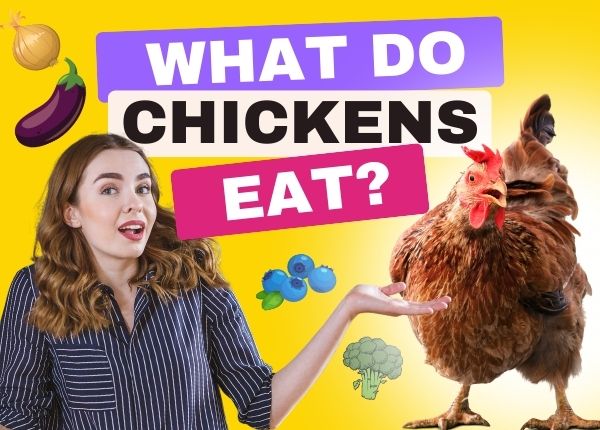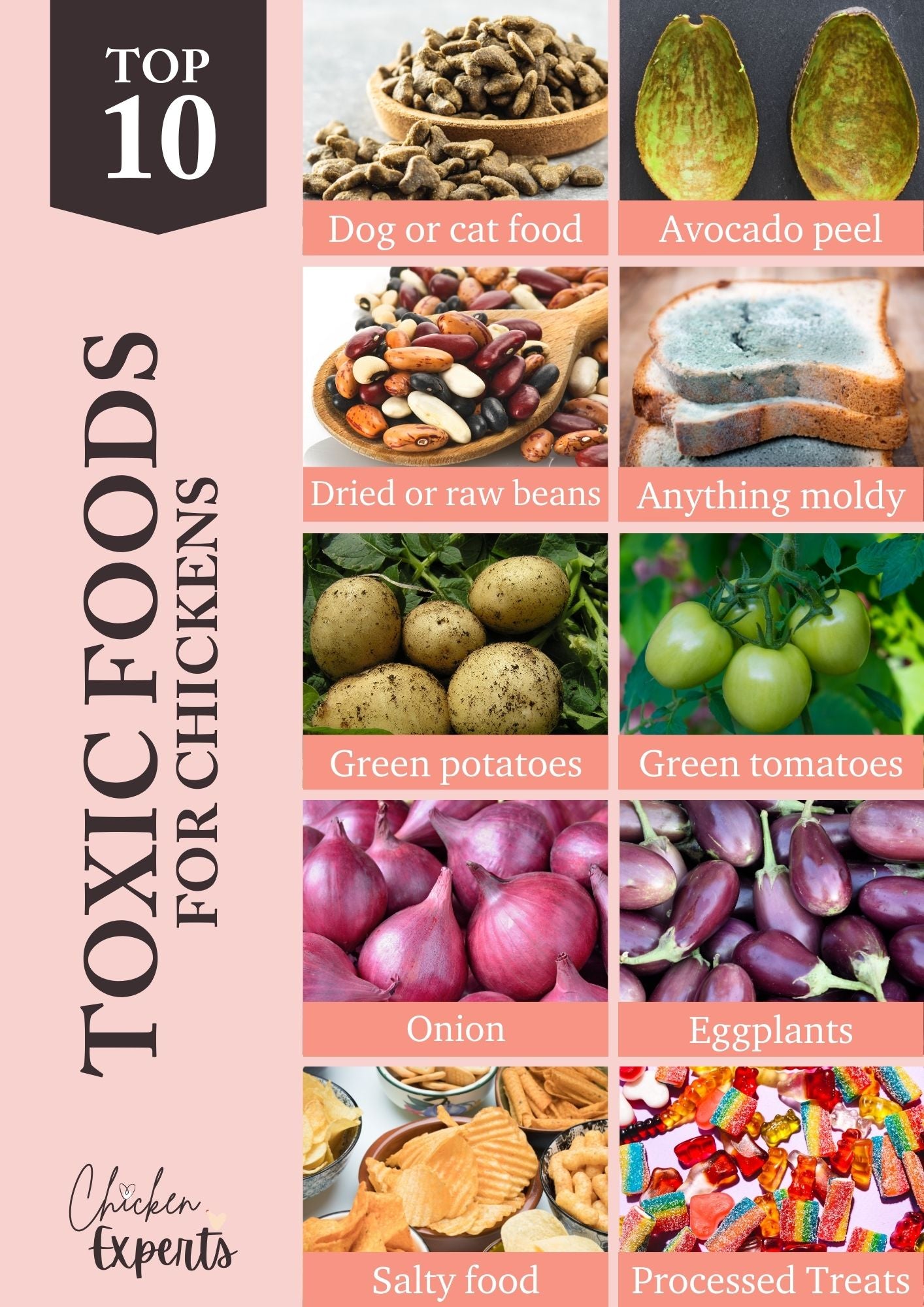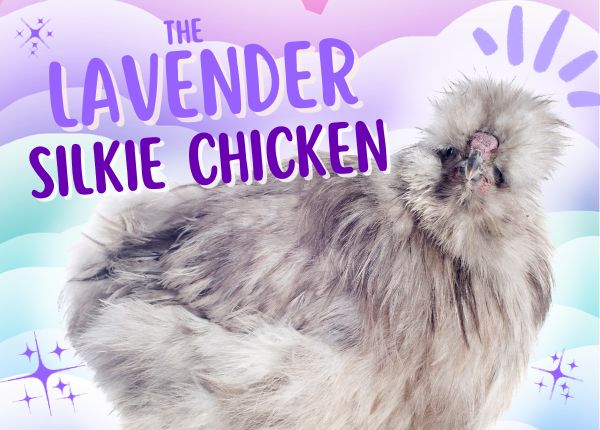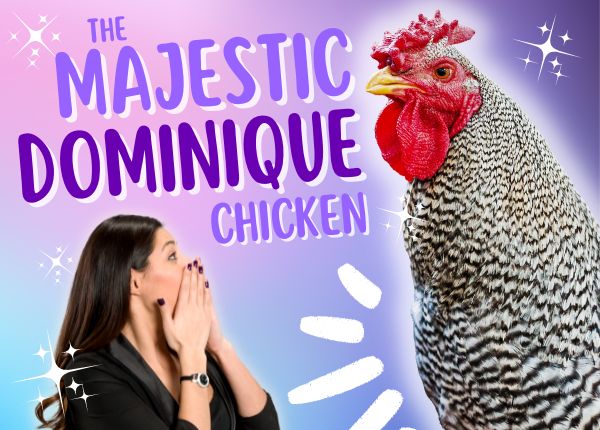
So, you want to know what chickens eat? What don’t they eat, more like!
Chickens will peck at pretty much anything they can get their cheeky little beaks on! They live to eat.
Just to be clear, what chickens should eat and what chickens willeat are two very different things.
Chickens should eat a healthy, balanced, omnivorous diet of protein, carbohydrates, and key vitamins and minerals. But then… so should we! Hashtag guilty face! 🥺
Poultry, like people, aren't always angels on the diet front.
Chickens will eat cow pats, toenail clippings, lego, your mail, screws, cat food, anything shiny (including your favorite earrings – straight from your earlobes), their own eggs, and their coop-companions poop with a side of feathers. What can I say, they are curious critters!
I’m guessing you’re here to learn what to feed your chickens daily, so that’s what we’ll cover.
Chickens love their food, and if you feed them well, they’ll love you too.
Your Bite-Sized, Beginner’s Guide to Feeding Chickens.
We’re going to blast through the basics, so you’ll know what to shop for to keep your chickens healthy and happy. You’ll know which chicken feed to dish up daily, when to switch it, which tasty treats are good to go, and which are a total no-no. Think of this read as your chicken-feeding appetizer.
Seconds Please!
Once you’ve aced the basics of chicken nutrition, then it’s time for mains. Check out my comprehensive chicken feed blog for all the nitty gritty about chicken feed (and indeed grit).
One Dish of Chicken Feeding Knowledge Coming Right Up!
What Do Chickens Eat Daily?

Each day your chicken needs access to the following five dietary fundamentals:
1. Chicken Feed
Chicken feed should make up 90% of your chicken’s daily diet. It’s a pre-mixed muesli-like food that contains all the nutrients and vitamins your chicken should need to get by.
Most chickens will cope fine on a diet of good quality chicken feed and water, but to optimize their diet, tantalize their taste buds, and keep them happy, flappy, and content, you should also include a few side dishes:
2. Chicken Treats
Treats should make up no more than 10% of your chicken’s daily diet, however much they pester you!
We all know that desert tastes better than mains, and if they can get away with it, they’ll skip their healthy chicken feed and happily live off treats alone. Feeding your chickens treats by hand will help you to bond as well as monitoring their intake.
3. Chicken Graze (or free-ranging)
Foraging for food is an instinct that chickens just can’t resist. If your chickens are free range, then you won’t need to supply anything extra to encourage grazing. They really will find everything they need in the most barren of backyards.
For chickens with limited access to nature’s delicacies, scattering chicken scratch or seeds encourages activity and sneaks in some exercise, keeping the little peckers occupied so they’re not feeding on each other’s feathers. You can just scatter a few handfuls now and then.
4. Oyster shells
If you have laying hens in your flock, an optional calcium supplement such as crushed oyster shells should always be available. They’ll only take what they need, and you’ll rarely need to top up a small bowl or feeder.
5. Grit
If your chickens are free-range or eat nothing other than a complete chicken feed, then they won’t need extra grit. If they’re having any sort of treats alongside their feed, then they’ll need access to grit to aid their digestion. It’s not technically food, but it goes in, so it’s going on the list! Just like calcium supplements, you’ll only need to offer a small container and top it up periodically.
H2-Oh So Important!
Your chickens should always have access to plenty of fresh water.
Find out how much water chickens need, and which waterers are best in my waterers blog.
What’s In Chicken Feed?

Chicken feed is made up of grains, corn, different kinds of wheat, oats, or barleys. Different products will include extras like fishmeal, bonemeal, seeds, dried fruits, salts, and vitamins. No two chicken feeds are quite the same, and you can make your own at home if you want to.
It’s important to find the right chicken feed for your chicken’s needs (age and stage of life they are in).
Do All Chickens Eat the Same Food?
Most chickens will do fine on a similar diet, but to get the best out of your eggy investments, you should tailor their diet to suit their specific needs. Your chicken’s core dietary needs will vary depending on these five feeding factors:
1. Their Breed
…or more to the point, their size. You cannot feed a flock of Jersey Giants the same amount of food as a pair of Silkie bantams.
2. Their Stage of Life
Chicks have different needs than adult birds, and pullets have different needs to mature roosters. Your chicken’s diet should change throughout their lives.
3. Their Purpose
Whether your poultry pals are primarily pets or pay their way with eggs, roosters, or meat birds, they’ll all have unique feed needs.
4. Their Environment
Free range chickens require a lot less from their humans than cooped chickens, and the climate and time of year will impact all chicken’s protein requirements.
5. Their Palate
If you haven’t worked this one out yet: chickens have opinions. Lots of opinions.
Making well egg-ucated decisions on what to feed your feathery friends will benefit their health and help to avoid pricey and heart-breaking illnesses.
What Do Chickens Eat in The Wild?
Chickens didn’t evolve being dished up store-bought feed and oyster shells. So, what do chickens eat in the wild?
As omnivores, a chicken’s natural diet is made up of plants, seeds, fruits, and vegetables as well as bugs, rodents, frogs, and even snakes. They’ll eat pretty much anything they can get their beaks into, and whilst they tend to know which plants and animals are dangerous or harmful and steer clear, they don’t always get it right.
What Weird Things Do Chickens Eat?
Ready for some chicken shaming? Here are just a few real egg-samples of naughty nibbles:
“I’m Doris. I ate my owner's engagement ring”
“I’m Lizzie and I eat Florence’s feathers. She’s bald now.”
“I eat my sister’s poop”
“I like to eat the dog’s poo…and I’m NOT sorry”
“I eat the Mums roses. I don’t know why. I can’t stop.”
Time To Name & Shame!
What Funniest Thing Your Chicken Tried to Eat?
Answers in the comments☺
Do Chickens Eat Eggs?
Chickens do indeed eat chicken eggs, including their own. It scrambles your brain, doesn’t it?
Chickens with nutrient deficiencies are the most likely to sneak a peck at an egg, and once they realize how good they taste, it’s a tough habit to crack. Making sure your chickens have a comprehensive diet with additional calcium supplements readily available should reduce the odds of witnessing this rather nasty habit.
Which Foods Shouldn’t Chickens Eat?
There are lots of comprehensive reads available that cover every possible plant, seed, and insect that chickens can consume safely. You may need to sacrifice an hour of your life to read that though, and they can be a little hard to digest. If you’re anything like me, you won’t remember it all anyway.
I’d say it’s kinder on the brain cells to know what not to feed your chickens and consider everything else good to go.
Some foods to avoid result in intolerances, but others are potentially toxic.
If it’s unhealthy for humans then it’s unhealthy for chickens, so even if it’s not on the no-go list below, feed it in limitations. Here is my Top 10 list of what NOT to feed chickens, followed by my Top Treats For Chickens, because we all love to spoil our kids!

- Dog or cat food is far too high in protein for chickens. Don’t do it.
- Avocado (the flesh can be eaten in moderation, but never give them the peel or stone)
- Dried or raw beans
- Anything moldy — including their usual feed once it looks like it’s gone off (for example if it wasn’t stored correctly)
- Green potatoes
- Green tomatoes — or tomato plants in general
- Onion - onion can be toxic and impact egg production
- Eggplants/Brinjals
- Salty food
- White rice - limit white rice, pasta and bread and instead opt for higher nutritional foods like whole grains and seeds such as brown rice and whole wheat
- The starch in raw potato peel can cause bloat, so don’t overdo it on the table scraps.
- Sugar, sweets, processed treats, avoid all of these!
Feeding Your Chickens - Hungry for More?
Cluck link to chicken feed blog to find out:
- How Much Should I Feed My Chickens?
- What Varieties of Chicken Feed Are There?
- Which Chicken Feed is Best for Chickens?
- How Much Food Do Chickens Eat?
- Do Chickens Need More Food in The Winter?
- What Is Free Feeding?
What Do Baby Chickens Eat?
Hatchlings only need starter feed and water. Nothing more. Feeding hatchlings is nerve-wracking and adorable. Watching them wobble about looking for their first nibble is super sweet.
For the first hour you needn’t feed your hatchlings at all, just offer them water, then move on to starter feed and introduce treats after they’ve learned to eat their dinner nicely. Chicks will only need about one ounce of starter feed a day each and can be fed this up until 6 weeks old.
Feeding Baby Chickens - Hungry For More?
Cluck link to chicken feed blog to learn:
- Chicken Feed Milestones
- How To Feed a Baby Chick
- What’s in Starter Feed
- What To Feed a Pullet
- What’s in Grower Feed
What Do Hens Eat?
Once your precious little pullet pops out that first egg, she’s ready for a change in diet. She’s all grown up!
Laying hens need a different diet to pullets. Their bodies are performing some cracking tricks, but that requires a very healthy diet with more calcium to help those eggshells stay nice and firm.
Graduating from grower feed to layer feed is best done gradually, as a change in diet can give even the toughest Momma hen a funny tummy.
Feeding Laying Hens - Hungry for More?
Cluck link to chicken feed blog to learn:
- What’s in Layer Feed?
- Will Feeding Your Pullet Layer Food Speed up her Laying?
What Do Meat Chickens Eat?
Meat birds, or broilers, are bred for their speedy growth. They get bigger faster than other breeds, and that’s why they need more feed and lots of protein to help them grow up big and strong.
Broiler starter feed has about 22-24% protein, and whilst other stages of broiler feed are available, most keepers agree you can stick to the same feed for their short life span. This is all they’ll need from their first to their final dish.
Most chicken keepers free feed their meat birds for 2 to 3 weeks and then free feed for one day and leave without feed for the next, and so on until they are ready to become dinner themselves.
What Do Roosters Eat?
It’s not sexist to ask. You’re right to wonder. Roosters do best on grower feed for their adult years as they need more protein but less calcium than laying hens.
Your rooster will be fine if he takes a bite of layer feed, but don’t add any extra calcium to the shared feed if you know your rooster likes to dine with the Mrs.
What Do Chickens Eat as Treats?
Chickens adore snack time. They will soon be tottering over at the first glimpse of you chattering away and trying to woo you into sharing your stash with them.
You thought kids were bad? Chickens have perfected pestering!
Here are some ideas for healthy snacks from Chickenpedia that your poultry-pal will adore you for:
How Much Do Chickens Eat?
Off shopping with no idea how much to buy? Here’s a handy guide to chicken feed consumption:
Chicks 1-ounce starter feed a day
Pullets 2-3 ounces grower feed per day
Laying Hens 3.5 - 4 ounces layer feed a day
Roosters 6-8 ounces a day
Bantams 1-1.5 ounces feed per day

Do Chickens Eat Grit?
Chickens eat grit, but not as food, as a tool. Grit is to chickens what teeth are to humans: chomping power! When free-ranging they naturally pick up grit in the form of tiny pebbles on the ground. They store grit in the gizzard and when the gizzard moves, the food is ground. As they are in your backyard, not the wild full-time, it is a good idea to supplement some into their diet, as full crop can cause serious health issues.
How Do Chickens Digest Their Food?
Chickens have a 4-step digestive process which works perfectly for their diet and lifestyle.
- Chickens are pretty well adapted for foraging. Those short, pointy beaks let them pick up tiny seeds and tactile cells inside their mouths let them distinguish good food from bad food before it gets swallowed. They’re curious beasts though, and sometime risk it for a biscuit.
- Chickens hang onto their food in their crop, a pouch in their esophagus,before it’s passed on to their stomach for digestion.
- Digestion begins in theproventriculus, which works similarly to our stomachs: breaking down food with digestive enzymes,before it’s passed on to their gizzard for further digestion.
- It’s in the gizzard that strong muscle contractions and soil, tiny pebbles, or supplement grit are used to grind the food down and release the nutrients.
Which Chickens are Cheapest to Feed?
If you pick a poultry pal who loves to graze, then your shopping bill will decrease. Fact!
Here are 10 of the best free-range chickens to keep:

- Ameraucana
- Golden Comet
- Leghorn
- Plymouth Rock
- Rhode Island Red
- Welsumer
- Jersey Giants
- Sussex
- Egyptian Fayoumi
- Buckeye
Have you ever wondered…
- How Much Water Do Chickens Drink?
- How Do I Feed a Mixed Flock with different needs?
- How Do I Feed a Baby Chicken that won’t eat?
- How Do I Know My Chicken’s Diet is Right for Them?
- How Should I Store My Chicken Feed to Make it last longer?
- Which Chicken Feeder should I buy?
Did you know that…
Feeding a medicated starter feed to a vaccinated chick can neutralize their vaccination? I know! Scary, right?
Check out my comprehensive Chicken Feed Blog to learn more.
It’s easy to dish up a diet that you think will be good for your feathery friends, and then learn that you’ve made a costly mistake.
You can’t master keeping chickens in a day, there’s just too much to learn, but investing a little time in learning about your chicken’s nutritional needs will make a huge difference to their health and wellbeing. Healthy hens save you time, heartache, and money. Why wouldn’t you prepare?
Have I whet your appetite for knowledge?
Mistakes in chicken nutrition can be dangerous and acting fast when your chicken does inevitably eat something that they shouldn’t, your knowledge can be – quite literally - lifesaving.
Chickenpedia’s chicken nutrition course is the safest and easiest way to get prepared and feel reassured about feeding your poultry pals. After all, you are what you eat, and you are eating their eggs!
You can even complete it in digestible chunks to fit around life.
Here are just a few tasters of what you’ll learn:
“Did you know that eggs — especially egg yolks can be a great boost for your chicks? Scramble some eggs (and add a touch of fresh garlic for an extra boost) and serve it up along with their starter crumble for a yummy, immune-boosting meal.” (Chickenpedia’s Chicken Nutrition Course)
“Should your chickens eat something they shouldn’t, you will need to take immediate action. Remove the rest of the objects or foodstuffs that they had eaten from the chooks’ environment. Keep a sample of it in a sealable plastic bag that you can later show the vet if required.” (Chickenpedia’s Chicken Nutrition Course)
“Some feeds also include added omega-3 that will increase the eggs’ omega-3 count that makes them even healthier for humans to eat.” (Chickenpedia’s Chicken Nutrition Course)
“Garlic has many health benefits and small amounts of crushed garlic added to your chickens’ feed can help to give your chooks’ immune system a boost while also keeping their worm load in check.” (Chickenpedia’s Chicken Nutrition Course)
Bon Appetit
When it comes to chickens, it’s fair to say that you’ll get out what you put in.Your chickens’ nutrition matters for their health, wellbeing, lifespan, and the quality of their eggs and meat.
But, what to serve the serial snackers for their supper won’t be the only thing you find yourself scratching your head about:
Which coop is best for them? How can I keep predators at bay? How can I have a nice garden and keep chickens…is it even possible? How on Earth will I cope if one of the little crackers gets Pasty Butt?
Check out Chickenpedia and get access to all the egg-spert knowledge you’ll ever need, all in one place. No cross-checking, no panic researching: Chickenpedia will become your chicken care bible. If the answer you’re clucking for isn’t on their site, you can ask the team directly! They’ve got your beack…I mean back.











Leave a comment (all fields required)